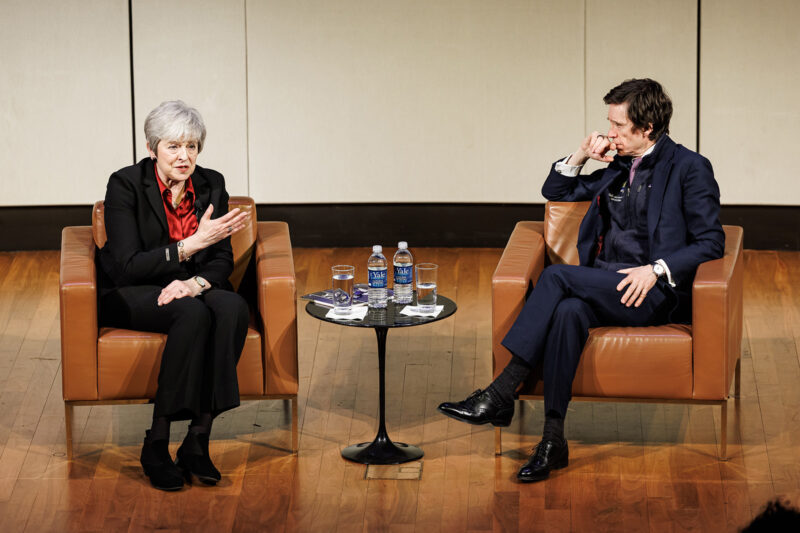Former UK prime minister and Blue Center Senior Fellow Theresa May recently spoke at Yale on the importance of protecting democracy amidst the threat of numerous geopolitical challenges.
Theresa May can recall, near the time of her entry into politics, watching the broadcast of South Africa’s first democratic election in 1994. The image of thousands of South Africans — of all races, for the first time — standing in line for hours to cast their vote inspired her and continues to serve as a guiding principle for her to this day.
“That moment was, in a sense, what democracy is about: the ordinary, humble people having their say in who should govern them,” said May during a keynote speech delivered at Yale University on April 2. “A true democracy gives people the freedom to choose. A true democracy gives people a voice.”
The event was hosted by the Blue Center for Global Strategic Assessment at the Jackson School of Global Affairs. Last year, May — who served as prime minister of the United Kingdom from 2016 to 2019 after more than two decades in the British Parliament — was named the Blue Center’s inaugural Senior Fellow.
In her speech, May discussed what she believes are the pillars of democracy — the rule of law, transparency in government, and space for genuine debate. These principles are intertwined in a functioning democracy, she said; each person and the bodies that govern them should be held to the same standards, building trust amongst the people even when they may have dissenting views.
Many of these principles have been eroded, May said, particularly the ability to compromise with those with whom you disagree. “In our absolutist world, compromise is seen as weakness, and absolutism is a sign of strength,” she said. “It’s important to listen to another person’s point of view, to respect their right to hold that view and to be able to debate points respectfully.”
May said this breakdown of productive debate has been exacerbated by the rise of social media, where extremist views often take root and are spread by algorithms. This, she said, creates one of democracy’s greatest challenges: how to determine what is true.
“Social media makes it harder to know where to go to find the truth,” May said. “That can be exploited — by those who want to succeed electorally and those who want to destabilize and, ultimately, destroy democracy.”
Amongst young people, trust in democracy is already being challenged, May said, citing a recent study from the University of Glasgow that found more than 60% of people in the UK aged 16-29 believe democracy “is in trouble.” In the same study, more than 25% of those surveyed back dictatorship over democracy, said May.
To this, May posed a question: Is this a lack of trust in democracy itself or a lack of trust that democracy will deliver? “What young people want from politics is a more open, honest political culture which provides answers to their basic needs.”
During her time at Yale, May said she has “been pleased to see a genuine commitment to the values of democracy” and encouraged the students in attendance to share those values. “Let’s believe in democracy,” she added, “and let’s ensure that those who polarize cannot damage our democracy.”
Following her speech, May was joined in conversation by Rory Stewart, Professor in the Practice of Grand Strategy at Yale, and a former fellow Conservative Party member of the British Parliament with May. Stewart lauded May for representing “a vision of liberal democracy” and “a moral vision,” even when faced with great challenges — most notably, UK’s decision to depart the European Union.
“Where this is seen most strongly is her ability to challenge institutions, to stand up and make herself unpopular by asking very difficult questions,” said Stewart, “and patiently, having the courage to fix them.”
